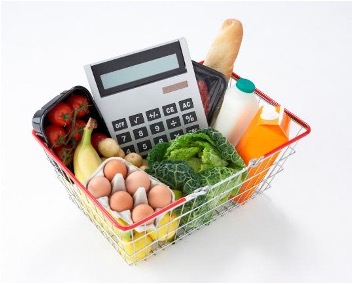Written by UConn Dietetics Student Brooke Bosco
There are many different factors that can affect our grocery bills, whether they are personal or world events like the pandemic. The following strategies may help you to spend less, waste less, and save more! 
Cut back on strict meal-planning
Although meal-planning is suggested as a strategy to save money, it does not give you the flexibility to take advantage of sales or ingredients you already have at home. It can be more cost efficient to pick up good deals when you come across them and plan your meals accordingly. Also, use ingredients you may have at home already. Do you have any leftovers you can work into a new meal? Be creative!
Check for what is in season
Support your local farmers and consume more seasonal produce. Seasonal items have far less distance to travel, so are not as affected by energy costs and shipping delays. Spring, summer and fall in CT offer up a variety of fresh fruits and vegetables. In the summer, good prices can be found for fruits and vegetables such as asparagus, strawberries, rhubarb, and summer squash. In the fall or winter, look for squashes such as acorn and butternut. In the winter, look for root vegetables such as regular and sweet potatoes, onions, and garlic. You could even grow some of these in a garden of your own!
Add legumes to your meals!
Whether they are dry or canned, legumes (also known as pulses) are inexpensive, shelf-stable, and a great source of protein. If you are cooking them from their dry state, they are easy to prepare; just simmer in salted water until fork-tender. Try using legumes in soups, salads, casseroles, or rice dishes.
Save on energy costs while cooking
Utilize the energy you are already paying for! Smaller appliances like toaster ovens and air fryers draw about half the energy of a full-sized oven, and generally do not require preheating. When using your full-sized oven, use the extra space to cook more food at once and get a head start on future meals!
Freeze, freeze, freeze
Virtually any food can be frozen to extend the shelf life of leftovers or raw ingredients. If you have some vegetables sitting out getting wrinkly, cut them up and freeze them in quality freezer bags for a later date. Just keep in mind that for dairy products like milk and yogurt, the fat might separate once thawed.
Adapted from: Rosendaal, J. V. (2022, May 27). How to reduce your grocery bills in seven easy steps. The Globe and Mail. Retrieved June 1, 2022, from https://www.theglobeandmail.com/life/food-and-wine/article-7-ways-to-save-money-cooking-at-home/?utm_source=dlvr.it&utm_medium=twitter&utm_id=reduce_grocery_bill&s=09
Photo retrieved from: https://www.advantageccs.org/blog/how-to-set-up-a-budget-for-food/
This material is funded by UDSA’s Supplemental Nutrition Assistance Program (SNAP).
This institution is an equal opportunity employer.